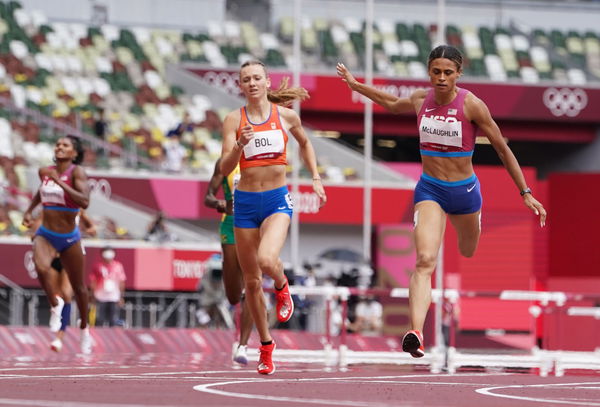
Imago
Credits: IMAGO

Imago
Credits: IMAGO
She’s fast, focused, and fiercely determined. But even for a world champion like Femke Bol, the weight of chasing greatness can be heavy. As she prepares to defend her crown at the Stockholm Diamond League on June 15, all eyes are on the Dutch star. Not just for her blistering speed, but for how she’s handling the psychological war of trying to keep pace with the most elusive figure in women’s hurdles, Sydney McLaughlin-Levrone.
Watch What’s Trending Now!
Bol’s return to Stockholm isn’t just another stop on the Diamond League tour. It’s where she began her ascent to global dominance back in 2020, and where she’s reigned supreme ever since. She owns both the meeting and stadium records at the Olympic Stadium and has turned this Swedish stage into her personal showcase. But beneath the surface of her success lies a more personal story. A relentless pursuit, not just of McLaughlin-Levrone, but of mental clarity in the chaos of elite competition.
“I think I’ve only had two races, so it’s been short so far, but I’m happy how it’s going,” Bol said in a recent interview with Euan Crumley from Athletics Weekly. “I’m mentally more open that it’s okay if I fail a couple of times.,” she further added. That admission, though subtle, reflects the evolution of an athlete who’s not just building muscle and speed. But building resilience. The 24-year-old has embraced the unpredictability of her sport and the changes that come with it, especially when your benchmark is someone as groundbreaking as McLaughlin-Levrone.
ADVERTISEMENT
She spoke candidly about how she approaches change. “The 14 step was a really big change. This is a pretty small one compared to that one… 400 hurdles is always one big puzzle and we’re trying to fit the pieces a bit differently,” Bol said. It’s not just the technique that demands constant refinement. It’s the mental game. Each tweak, each stumble, each new approach demands a psychological recalibration. And Bol has learned to stop resisting that mental turbulence. Instead, she welcomes it.
“It’s just working and listening to both my coach and my feelings. You just see it [improvements] from training session to training session.”
Femke Bol talks through the mental side of the 400m hurdles, her technique and the importance of marginal gains 🇳🇱
She competes over… pic.twitter.com/vP59zWyWKD
— AW (@AthleticsWeekly) June 14, 2025
“I just really like to work like this,” she said. “We make a good plan. We see what we want to change, then my coach will find a way.” Her approach is grounded in communication, trust, and self-awareness. There’s no arrogance. Only discipline, curiosity, and an unusual comfort with failure. In a sport where milliseconds matter and perfection is everything, Bol is leaning into imperfection to find her edge.
ADVERTISEMENT
As she returns to her Swedish stronghold, Bol isn’t just racing for another win. She’s racing against self-doubt, against old habits, and against a rival who’s redefined the sport. The physical race may last under a minute. But the mental marathon she’s running could be her greatest victory yet. And once she can conquer that, maybe, Femke Bol can add a fourth chapter to her rivalry with Sydney McLaughlin-Levrone. This time, hopefully, will be a new chapter unlike the previous three.
ADVERTISEMENT
Sydney McLaughlin-Levrone and Femke Bol’s rivalry peaked as Sydney crushed records once again
The clash between Sydney McLaughlin-Levrone and Femke Bol has been less of a rivalry and more a study in limits, of what is humanly possible and how close one can get to rewriting history before someone else already has. That Thursday night in Paris, the two met for the third time in a global final, with Bol chasing history and McLaughlin-Levrone sprinting ahead of it. The result? The American shattered her own world record yet again, clocking 50.37, and reminded everyone that in this event, there are greats—and then there’s her.

Reuters
Tokyo 2020 Olympics – Athletics – Women’s 400m Hurdles – Final – Olympic Stadium, Tokyo, Japan – August 4, 2021. Gold medallist Sydney McLaughlin of the United States and bronze medallist Femke Bol of the Netherlands in action in the final REUTERS/Lucy Nicholson
Femke Bol was where she needed to be coming off the final bend, two-tenths behind McLaughlin-Levrone, exactly as her coach Laurent Meuwly had envisioned. “The goal for Femke will be to stay as close as possible into the straight,” Meuwly had said. But the ‘straight’ wasn’t straight at all, it was a descent into something unreachable. McLaughlin-Levrone didn’t just maintain her lead; she obliterated it. Bol, despite running 52.15, (the 19th fastest time ever) was left in third, passed by a surging Anna Cockrell.
ADVERTISEMENT
For Bol, it was heartbreak. But for McLaughlin-Levrone, it was legacy. She became the first athlete to break six world records in one event, having sliced nearly two seconds off the mark in just three years. “It is Bol’s bad luck that McLaughlin-Levrone chose to run the 400m hurdles,” the post-race commentary noted with brutal clarity. But Bol’s presence remains vital, if only to show us the scale of McLaughlin-Levrone’s genius. In a race where one would’ve once been crowned queen, she now merely confirms who wears the crown.
Top Stories
Bryson DeChambeau Releases Fresh Statement on His LIV Golf Future Post Brooks Koepka’s Exit

Andy Reid Fires Coach In Attempt to Rebuild Staff After Receiving HC Requests For Chiefs’ Coordinators

Jerry Jones Uses Donald Trump’s Controversial Venezuela Comments Amid Search For Matt Eberflus’ Replacement

Sources: John Harbaugh Wasn’t Fired, Left Ravens After Refusing Major Staff Changes

Three Arrested in Cleveland For Burglary at Shedeur Sanders’ Home

Mike McDaniel Contract: How Much Do Miami Dolphins Owe the Fired Coach?

ADVERTISEMENT
ADVERTISEMENT
ADVERTISEMENT

